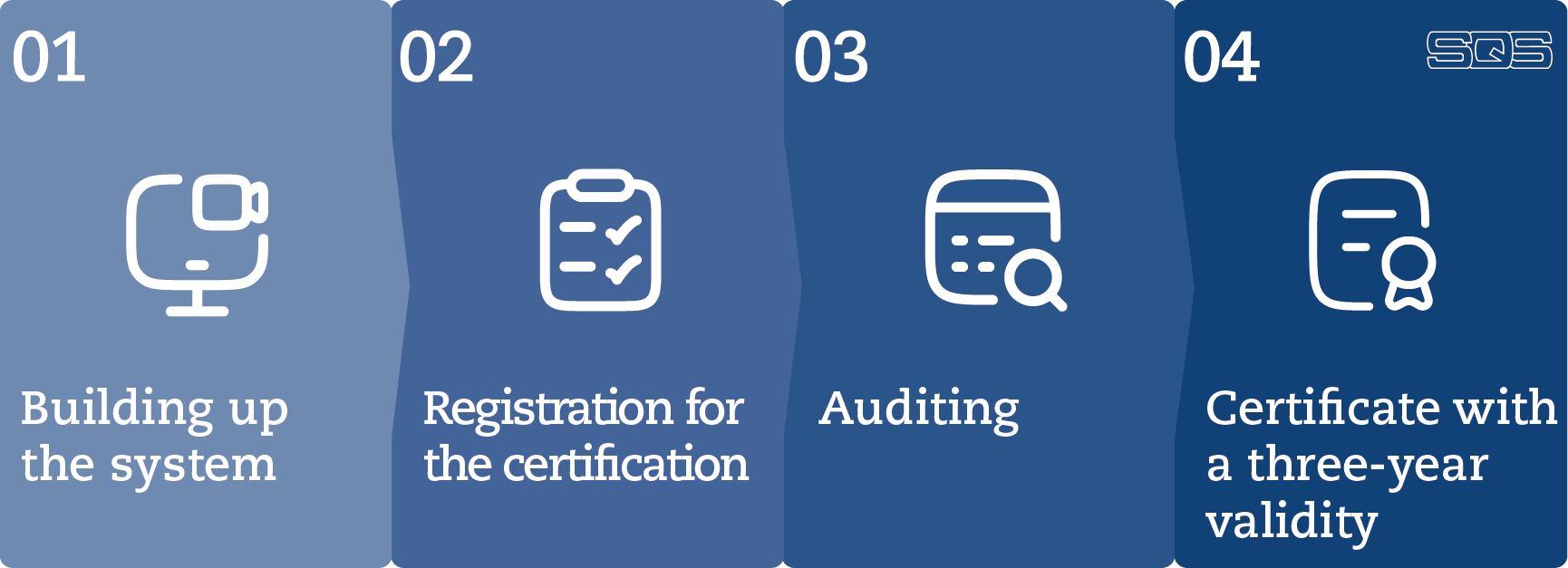IRIS Certification® rev.04 (ISO 22163:2023 and IRIS Certification® Performance Assessment:2023) of the Union of European Railway Industry (UNIFE)
– Rail applications - Railway quality management system - ISO 9001:2015 and specific requirements for application in the rail sector
Proof of compliance with the rules and regulations for rail vehicle manufacturers and rail operators.

Leading certification body in Switzerland

Recognised internationally for access to markets worldwide

We have been certifying management systems since 1983

Around 7 000 customers trust our Services
Railway quality management systems according to IRIS Certification®
The IRIS-certification serves to improve the quality and safety in the entire supply chain of the rail vehicle industry. It is applicable for companies with product development-, manufacturing- and maintenance activities along the entire supply chain. The aim is a continuous improvement with emphasis on error prevention and -reduction in the supply chain as well as the improvement and maintenance of product quality and its safety aspects.
Target groups of IRIS Certification®
Companies and organisations in the rail vehicle industry.
Validity period of the certificate
3 years - there is an annual audit to ensure that standards are being maintained and a recertification audit after 3 years.
Recognition of the SQS certificate
The certificate is published on www.iris-rail.org and is internationally valid.
Responsible for the product and there for you

Fatih Haciismailogullari
Do you have any questions about the standard or our service? Would you like to know more about the certification process and the costs? Or may we provide you with a concrete offer for the certification?
We are happy to help you. Our account management team and I, as the product manager, will be happy to forward your questions to our experienced auditors. We want to make it as easy as possible for you to access certified management systems.
Please let us know how we can support you. We look forward to hearing from you!
Kind regards
Fatih Haciismailogullari
Highest quality and process reliability
With an IRIS certification, companies ensure that their products and processes meet the strict requirements of the railway industry. Consistent error prevention and continuous process optimisation increase reliability and help to reduce supply chain failures.
Recognition and market access
IRIS Certification® is a globally recognised system within the rail vehicle industry. A certified quality management system makes it easier for companies to access important markets and strengthens their position in the supply chain of well-known vehicle manufacturers and railway operators.
Clear and optimised processes
IRIS Certification® promotes a structured approach in all areas of the company. Thus, sources of error are minimised, workflows are made more efficient and processes are clearly defined. This leads to higher quality, improved safety and increased customer satisfaction.
If you feel fit for the standard, you are welcome to use the form above to register for certification. Otherwise, your path to an IRIS certification could look like this:

#1 – Building up the system
Implement your management system in accordance with the requirements of the standard so that you are ready for your first external certification audit by SQS.
#2 – Registration for the certification
After registering for certification, you can benefit from a preliminary talk or pre-audit. The pre-audit identifies system-relevant gaps and enables efficient certification.
#3 – Auditing
We first review your system documentation, assess your readiness for certification and draw up a detailed audit plan together with you. Our auditors then visit your company to assess the relevant test objects and the maturity degree of the management system and compile a report.
#4 – Certificate with a three-year validity
If the report is positive, you receive the certificate in digital and printed form. You can communicate it internally and externally for three years. Annual audits ensure compliance with the standard and enable continuous improvements. A comprehensive recertification takes place after three years.
The duration depends on the size of the company, the complexity of the processes and the degree of preparation. Both well-organised documentation and preparation speed up the procedure.
The certificate is valid for three years. During this time, a surveillance audit is carried out every year and recertification audit takes place after three years.
The costs vary depending on the size and complexity of the organisation. We would be happy to provide you with a customised offer.
No, our core competence is certification. However, if required, we will be happy to connect you with external experts or organise training courses so that you can optimally prepare for certification.
The certification body checks neutrally and independently whether your quality management system fulfils the requirements of IRIS Certification® and issues the certificate if the audit report is positive.
There is a central online database for IRIS certificates at www.iris-rail.org. To check the validity of a certificate, you can search there either by the name of the company, the registration number or other search criteria (such as location or scope).
If non-conformities are identified during an audit, the company is given a deadline to implement corrective measures. The certification cannot be issued or maintained without successful implementation.
IRIS is based on the principles of a quality management system (ISO 9001), but includes additional requirements that are specifically tailored to the railway industry, particularly with regard to safety, risk management and supplier control.
IRIS Certification® considers customer-specific and railway-specific requirements. Therefore, these must be integrated into the management system to fully meet the requirements of the railway industry.
A successful IRIS certification shows that a company fulfils the highest quality and safety standards and is continuously developing. This strengthens the trust of customers, investors and business partners and can secure the company's competitive position in the long term.
